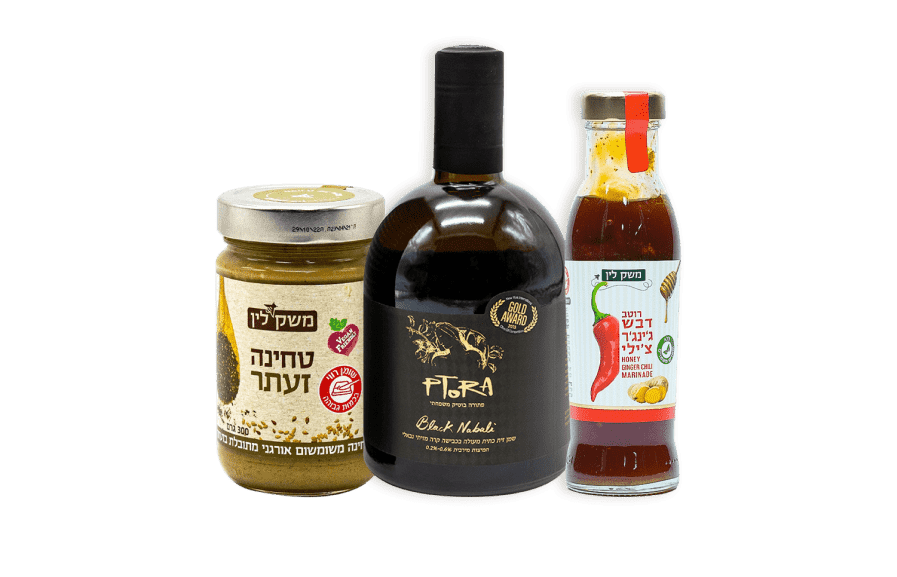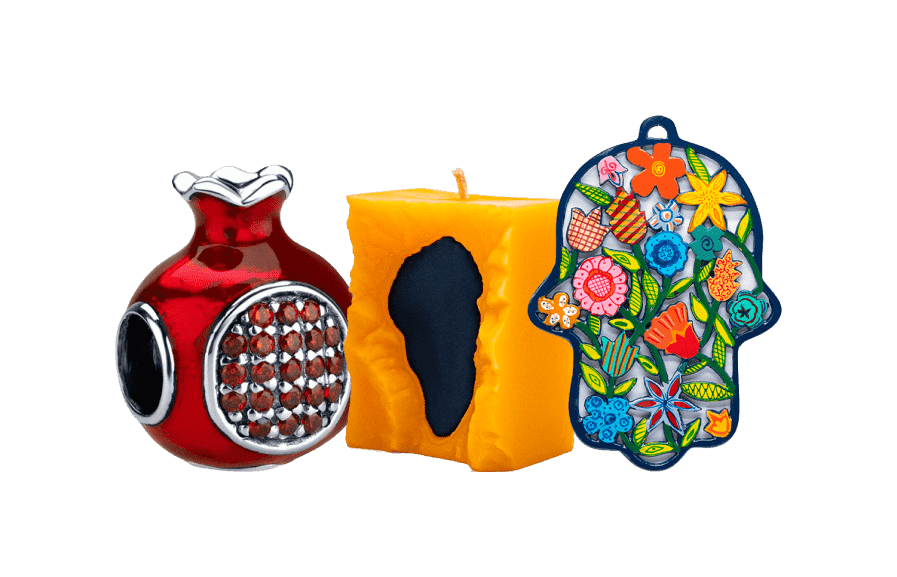"And God blessed the seventh day and He hallowed it, for thereon He abstained from all His work that God created to do." Bereshit (Genesis) - Chapter 2:3
After six days of creating the world, God's work was complete. The next day, he rested, declaring that the seventh day of the week would forever be a day of rest for the Jewish people. This day is called Shabbat, a time for rest from the material world. We focus on quality time with our families and strengthening our relationship with God through prayer and sanctification of the holy Shabbat.
We prepare delicious foods, clean our homes, and wear special clothes in honor of Shabbat. There are no phones, televisions, or cars; it is just us, our family, and God. Shabbat is the ultimate way to switch off from the hustle and bustle of the weekdays, give ourselves the recharge we desperately need from the previous week, and prepare for the next one!
We prepare delicious foods, clean our homes, and wear special clothes in honor of Shabbat. There are no phones, televisions, or cars; it is just us, our family, and God. Shabbat is the ultimate way to switch off from the hustle and bustle of the weekdays, give ourselves the recharge we desperately need from the previous week, and prepare for the next one!

The history of Shabbat goes all the way back to the beginning...
'And God completed on the seventh day His work that He did, and He abstained on the seventh day from all His work that He did.' Bereshit (Genesis) - Chapter 2:2
Immediately after God completed his momentous creation of the world, he prescribed Shabbat, the seventh day, as the day of rest. At the time, there were no precise instructions as to how to observe Shabbat.
It became clearer with the giving of the Ten Commandments to the Jewish people at Mount Sinai. There, in the fourth commandment, it says, "Remember the Sabbath day to sanctify it." Exodus - Chapter 20:8, and "But the seventh day is a Shabbat to the Lord your God; you shall do no work" Exodus - Chapter 20:10.
Here, we see two clear commandments hinting at how to observe and honor Shabbat. Through the beautiful words of the Friday night and Shabbat morning Kiddush ceremonies and the Havdallah ritual, in which we transition from Shabbat to the new week, we 'remember' Shabbat. And by observing the commandment not to carry out different types of work, we 'sanctify' Shabbat!
The 'work' we are told not to do was clarified shortly after the giving of the Ten Commandments when God instructed the people to build the Holy Tabernacle in the desert, “They shall make for me a Sanctuary, and I shall dwell amidst them.” Exodus - Chapter 25:8. The detailed instructions that followed would form the basis of Shabbat observance, with 39 different Melachot (actions) being identified, among them types of agricultural work and actions like lighting a fire, building, baking, and more.
It became clearer with the giving of the Ten Commandments to the Jewish people at Mount Sinai. There, in the fourth commandment, it says, "Remember the Sabbath day to sanctify it." Exodus - Chapter 20:8, and "But the seventh day is a Shabbat to the Lord your God; you shall do no work" Exodus - Chapter 20:10.
Here, we see two clear commandments hinting at how to observe and honor Shabbat. Through the beautiful words of the Friday night and Shabbat morning Kiddush ceremonies and the Havdallah ritual, in which we transition from Shabbat to the new week, we 'remember' Shabbat. And by observing the commandment not to carry out different types of work, we 'sanctify' Shabbat!
The 'work' we are told not to do was clarified shortly after the giving of the Ten Commandments when God instructed the people to build the Holy Tabernacle in the desert, “They shall make for me a Sanctuary, and I shall dwell amidst them.” Exodus - Chapter 25:8. The detailed instructions that followed would form the basis of Shabbat observance, with 39 different Melachot (actions) being identified, among them types of agricultural work and actions like lighting a fire, building, baking, and more.

From lavish Friday night dinners to moving prayers and songs, this is Shabbat!
Welcoming in the Shabbat
The house is clean, and the family members wear their finest clothing. The honor of welcoming in the holy Shabbat falls to the mothers and wives of the family as they light the Shabbat candles, which rest upon their beautiful silver candlesticks. They recite a blessing and make a personal prayer for the welfare of their children. Then it's time to go to the Synagogue for prayers and the Kabbalat Shabbat (Welcoming in the Shabbat) service highlighted by the beautiful verses of the Lecha Dodi prayer.
A time for blessing
At the Friday night meal, we begin by singing the Shalom Alechem prayer and then Eshet Chayil (Woman of Valour), a song paying tribute to the incredible women of the family, followed by the Kiddush, which is recited on wine to sanctify the Shabbat. Next, each child receives a personal blessing from their parents, just like our patriarchs did for their children!
Shabbat meals
Then it's time for the Shabbat meal! Everybody washes their hands, and the head of the household recites the Hamotzi blessing over two loaves of 'Challah' Bread, handing a piece to each member present at the table. The Friday meal is a BIG deal, made up of many courses served with fine wine and other delicacies and accompanied by lots of singing of traditional Shabbat songs! Each family has their own traditional dishes and foods that they serve at their Shabbat meals, such as Moroccan fish or Eastern European Gefilte fish, and they are all delicious! And this is just the start of three meals we are commanded to have throughout Shabbat!
Prayer and connection
With no work to be done on Shabbat, this is the perfect time to connect with our Judaism by going to the Synagogue, studying Torah, and sharing insights on the week's Torah portion with those attending our Shabbat meals. This is also the time to catch up and spend quality time with the family and community without the distractions of everyday life and the digital world!

For thousands of years, the Holy Shabbat has been an integral part of Judaism and what it means to be a Jew. In today's nonstop world, in which most of us suffer from information overload and cannot break from the screens of our phones, computers, and televisions, it's safe to say that Shabbat is a literal Godsend. It gives us a break to physically, emotionally, and spiritually recharge our batteries and take stock of the more important things in our lives.
Shabbat is one of the core elements of Judaism that makes us who we are. For many, the sanctity of Shabbat is so important to our very beings that our people have even been persecuted and given up significant opportunities, whether in business or other areas, all in the name of sanctifying God's Shabbat. From the seventh day until creation, the Jewish people have kept Shabbat, and it is safe to say that Shabbat is one of the reasons the Jewish people are still here!
Shabbat is one of the core elements of Judaism that makes us who we are. For many, the sanctity of Shabbat is so important to our very beings that our people have even been persecuted and given up significant opportunities, whether in business or other areas, all in the name of sanctifying God's Shabbat. From the seventh day until creation, the Jewish people have kept Shabbat, and it is safe to say that Shabbat is one of the reasons the Jewish people are still here!

Tap into the holiness of Israel with our surprise packages based on themes influenced by the Bible and the Land of Israel!
At Lev Haolam, we live to share the love from Israel with all those who yearn to feel and experience it. The Holy Land is at the beating heart of all that we do, from the study of the Bible to travel to the regions where we can feel especially close to our patriarchs and matriarchs. And then, on Shabbat, we stop everything to observe and experience the holiness and special calm that envelop the Holy Land. We light the Shabbat candles upon beautiful candlesticks, sanctify the Shabbat on fine wine in a beautiful Kiddush cup and saucer, enjoy delicious meals with aromatic Israeli spices and herbs, and read the Shabbat prayers and weekly Torah portion from our prayerbooks and Bible. With our beautiful range of Shabbat and Judaica products made by Israel's most talented artisans, you too can enjoy an authentic Shabbat experience, just like we do, in the comfort of your own home.
Our knowledge and our close relationships with the pioneers enable us to choose products guaranteed to bring the joy of the Holy Land to all those who subscribe to our monthly packages containing the wonderful produce of Israel inside. We aim for them to feel the love from Israel and the pioneers literally! The 1,500+ positive reviews on Trustpilot and the wonderful messages we received directly from delighted subscribers, also via Facebook, motivate us to do even better than before!
Our knowledge and our close relationships with the pioneers enable us to choose products guaranteed to bring the joy of the Holy Land to all those who subscribe to our monthly packages containing the wonderful produce of Israel inside. We aim for them to feel the love from Israel and the pioneers literally! The 1,500+ positive reviews on Trustpilot and the wonderful messages we received directly from delighted subscribers, also via Facebook, motivate us to do even better than before!









